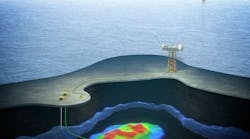Maureen Lorenzetti
There's a lot US oil and natural gas producers like about the pending comprehensive energy bill before the US Congress. Both the House and Senate bills include what the Independent Petroleum Association of America calls "producer provisions" that range from taxes to access.
It isn't clear yet whether the bill will be finished this fall or will stall into January. Many contentious issues remain, but extending domestic oil and gas tax breaks is not one of them.
That means, that if there is indeed an energy bill to be had this fall—or perhaps later this winter—producers, mainly independents, may win big.
Ten years waiting
"We've been waiting 10 years for this," Barry Russell, IPAA president, said last month at a press briefing.
Tax measures are still being finalized, although the House and Senate are said to be near agreement. Among the tax items expected to be included are a 24-month amortization of geological and geophysical costs, a 24-month amortization of delay rental payments, countercyclical marginal oil and gas well production credits, and suspension of the 100% net income limitation on percentage depletion for marginal production. An extension of the nonconventional fuels tax credit for new wells is also seriously being considered.
On land issues, a discussion draft circulated by House and Senate Republican conference leaders calls for a comprehensive inventory of oil and gas resources on the Outer Continental Shelf, including congressional moratorium areas. However, that provision, like proposed leasing of a portion of the Arctic National Wildlife Refuge, might not survive a final bill. The White House supports both measures.
A less controversial portion of the discussion draft creates a White House Office of Federal Energy Project Coordination designed to streamline energy permits on federal lands. Along those same lines, the pending bill requires interagency reviews of leasing and permitting procedures, a proposal already being pursued by the US Department of the Interior.
Similarly, the draft calls on DOI to expand the royalty in-kind program on federal oil and gas leases, slash royalties on marginally producing oil and gas wells when prices fall, lower or eliminate royalties on deep-pay natural gas produced in shallow Gulf of Mexico waters, and expand royalty relief for deepwater production. It also gives producers more time to hold on to some federal leases.
Alaska gas line
Many—although not all—independents oppose the idea of the US government giving financial help for a proposed Alaska natural gas export pipeline to the Lower 48.
Some Western producers worry the project might compete too much with production coming online from Rocky Mountain basins. The latest energy bill draft calls on federal regulators to expedite the Alaska pipeline's approval process and environmental reviews.
The draft also prohibits a "northern" route through the Beaufort Sea into northern Canada. Natural gas production incentives tied to the pipeline may be part of the tax portion of the bill; a Senate federal loan guarantee plan is off the table for now.
(Author's email: [email protected])

